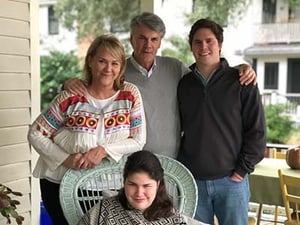By guest blogger, Mary Tutterow
Caring for a family member who is sick, disabled, or mentally ill can be very rewarding. After all, we are here on this earth to love and care for each other (John 13:34-35). But the fact of the matter is that most of us who are doing the caring will become burned out, exhausted, and overwhelmed. Some sources are even comparing the stress of chronic caring to PTSD .
Caregivers are called into the most intimate of all relationships – the fellowship of suffering. Not only are we called to take care of people in their deepest physical and emotional pain, but we are also given permission to enter into their personal “space.” We bathe, feed, and diaper them. We touch their disfigurements. We dress their wounds. We are trusted to administer medicines, even to make life-changing decisions for them. We advocate for them and interpret what they’re saying to others. We understand their moans and cries.

What an honor and a privilege!
Yet it can surprisingly lead us to some of the deepest pain in our own lives. It can lead us to dark places we never knew existed within us. The repetition, lack of progress, personal sacrifice, and physical exhaustion can wear us down leaving us weak, weary, and vulnerable to difficult, even dangerous emotions. Guilt and resentment top the list. Anxiety, depression, and even rage can emerge, creating a toxic environment for everyone.
The key to avoiding this breakdown is “self-care,” but what does that mean?
Some say that respite, time away from the person you are caring for to do things for yourself, is essential. While that’s certainly important, it’s difficult to find others who we trust to help. Even if we do get time away, we still have to come back and if we haven’t done the spiritual and emotional work on ourselves, we’ll go right back to toxic feelings and behaviors.
The most effective self-care comes in choosing to believe God about our situation and letting it shift our perspective. There is comfort and reassurance on every page of the Bible, but here are a few key concepts to help you today:
- You are not alone. God is real and present with the ability to get you through every moment of every day (Deuteronomy 31:6).
- It is Christ you serve. While the person you care for may be difficult or your situation seems hopeless, choose to see Christ in them and serve Him (Colossians 3:23-24).
- Loving, serving, and caring for others is why we are here. It is the very mission of Jesus (Mark 10:45).
- While you may have had to sacrifice much, there is no greater love than to lay down your life for another (John 15:13).
- Your love and hard work have tremendous value and you will eventually reap the benefits (Galatians 6:9).
Everything we believe to be the death of us is an invitation to a new beginning. We are not meant to recover. We are not meant to just survive this difficult time in our lives. Things aren’t meant to get back to the way they were. We are meant to emerge from this trial better, strong, closer to God. This is not just something to learn how to cope with. To find the real treasure that is the eternal, life-changing, and more-precious-than-gold, we need to press in.
God wants us to come to understand that He did not do this TO us. There is something wonderful and good that He wants to do THROUGH us. This is the paradigm shift, the point of transformation, the essence of the self-care. We will come to see ourselves, our situation, and the person we are caring for in a new way – through the light of God’s amazing love.
 Mary and her husband Winn live in South Carolina and are the proud parents of two adult children - William, who lives on his own, and Mary Addison, who lives at home with them. She has a chronic seizure disorder as well as mental and physical challenges, yet she is truly the Light in their family. Mary is the author of The Heart of the Caregiver.
Mary and her husband Winn live in South Carolina and are the proud parents of two adult children - William, who lives on his own, and Mary Addison, who lives at home with them. She has a chronic seizure disorder as well as mental and physical challenges, yet she is truly the Light in their family. Mary is the author of The Heart of the Caregiver.





